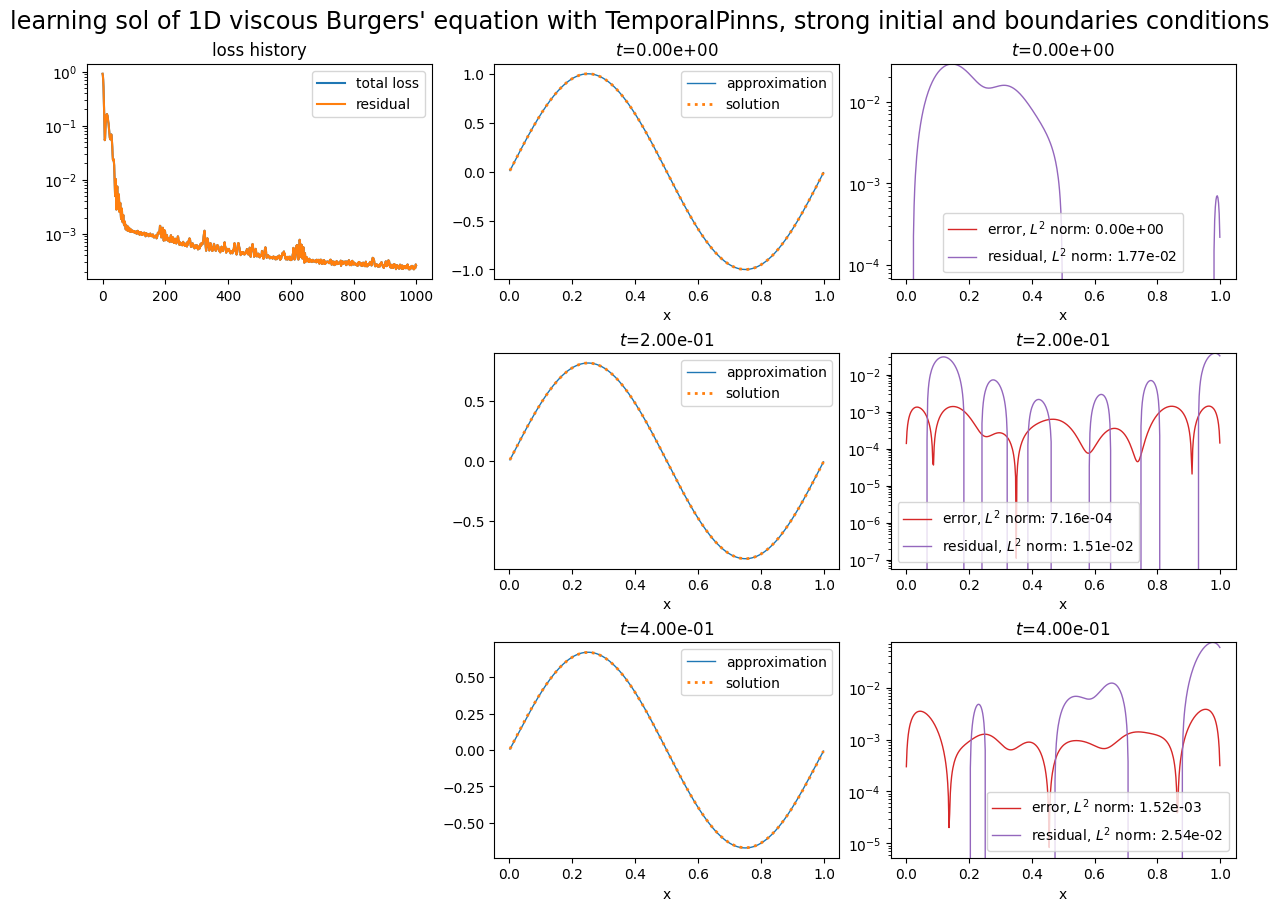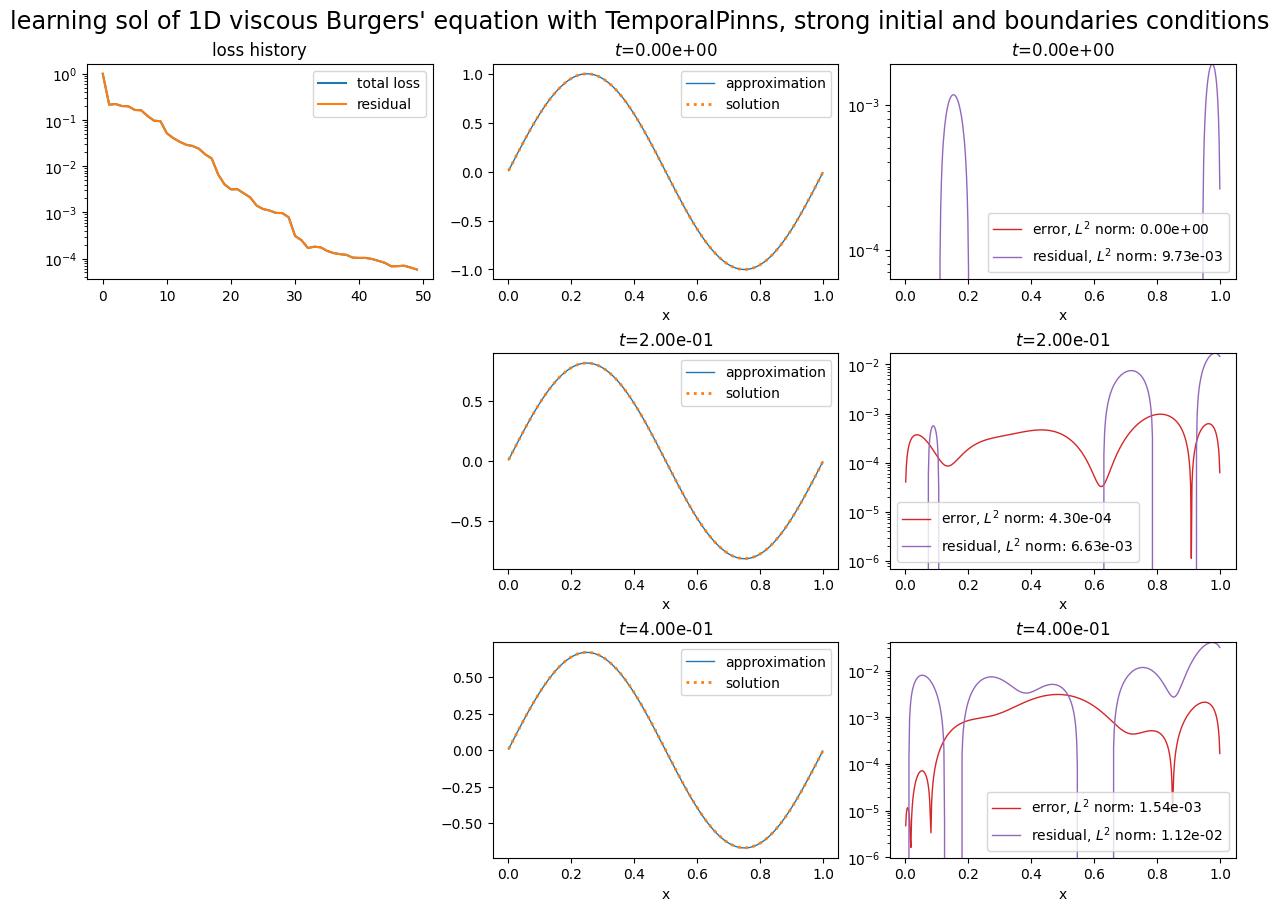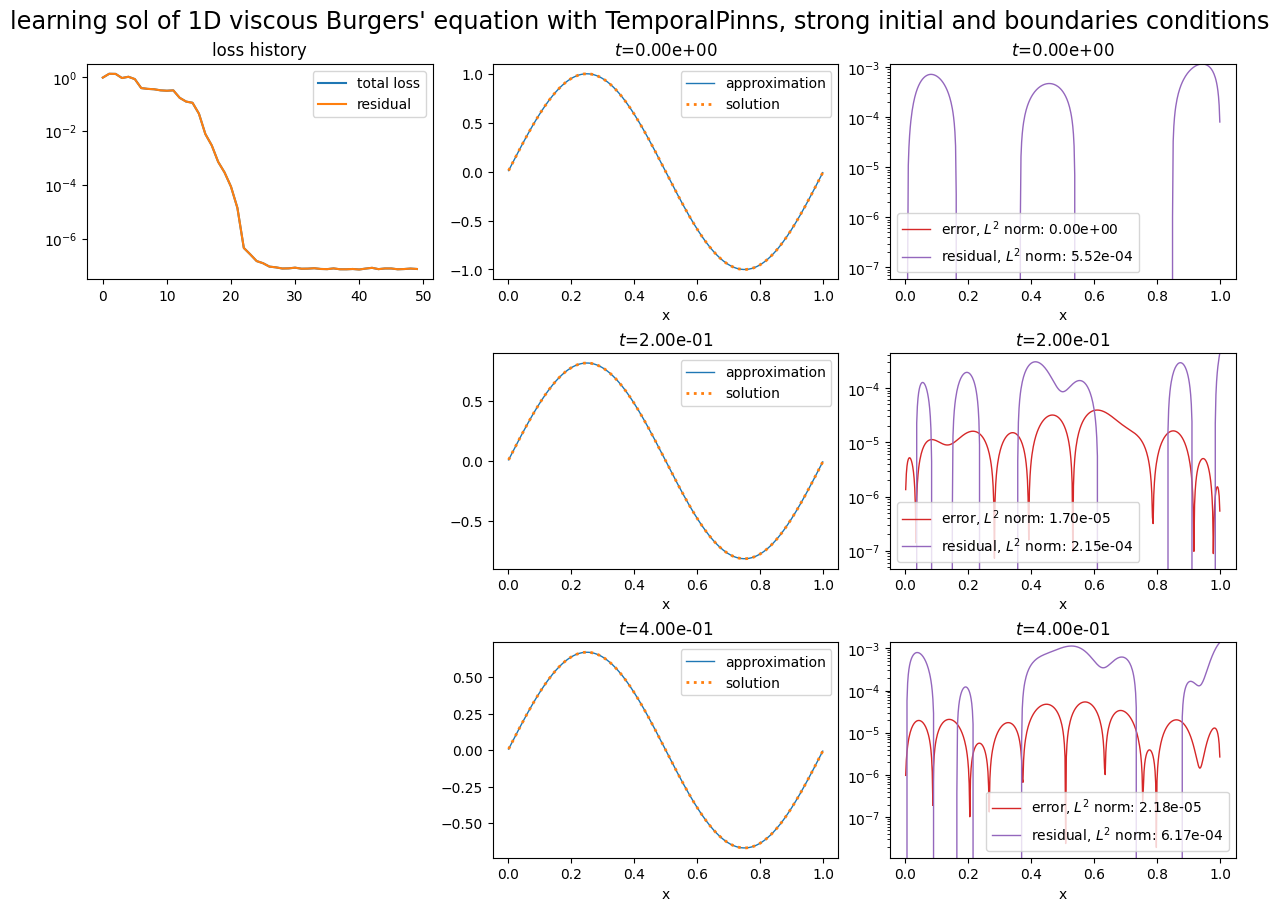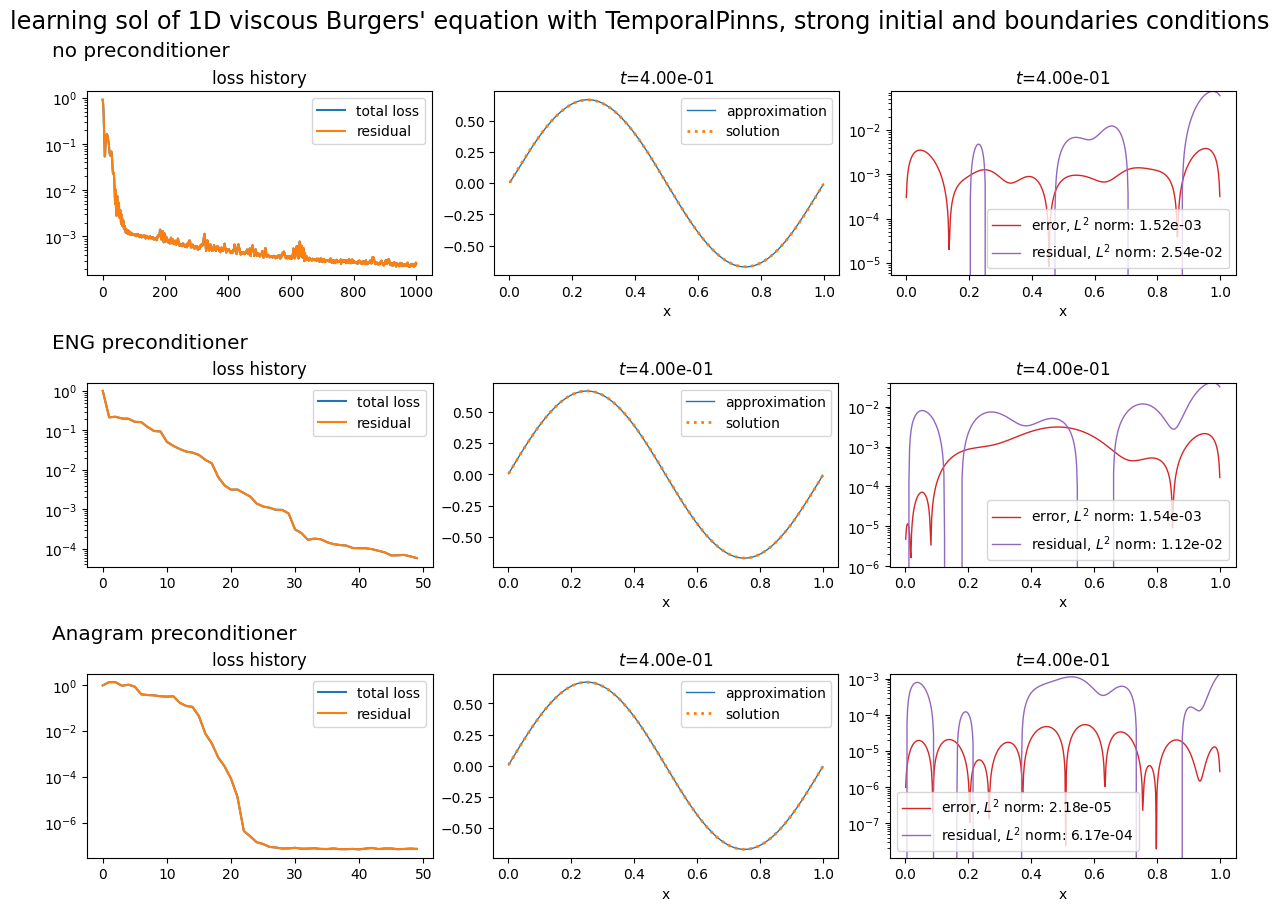PINNs: viscous Burgers 1D¶
Solves the viscous Burgers advection equation in 1D using a PINN.
\[\begin{split}\left\{\begin{array}{rl}\partial_t u + \partial_x \frac {u^2}{2} - \sigma \partial_{xx} u & = f \text{ in } \Omega \times (0, T) \\
u & = g \text{ on } \partial \Omega \times (0, T) \\
u & = u_0 \text{ on } \Omega \times {0} \end{array}\right.\end{split}\]
where \(u: \partial \Omega \times (0, T) \to \mathbb{R}\) is the unknown function, \(\Omega \subset \mathbb{R}\) is the spatial domain and \((0, T) \subset \mathbb{R}\) is the time domain. Dirichlet boundary conditions are prescribed.
The equation is solved on a segment domain; strong boundary and initial conditions are used. Three training strategies are compared: standard PINNs, PINNs with energy natural gradient preconditioning and PINNs with Anagram preconditioning.
[1]:
import matplotlib.pyplot as plt
import torch
from scimba_torch.approximation_space.nn_space import NNxtSpace
from scimba_torch.domain.meshless_domain.domain_1d import Segment1D
from scimba_torch.integration.monte_carlo import DomainSampler, TensorizedSampler
from scimba_torch.integration.monte_carlo_parameters import UniformParametricSampler
from scimba_torch.integration.monte_carlo_time import UniformTimeSampler
from scimba_torch.neural_nets.coordinates_based_nets.mlp import GenericMLP
from scimba_torch.numerical_solvers.temporal_pde.pinns import (
AnagramTemporalPinns,
NaturalGradientTemporalPinns,
TemporalPinns,
)
from scimba_torch.optimizers.optimizers_data import OptimizerData
from scimba_torch.physical_models.temporal_pde.abstract_temporal_pde import (
FirstOrderTemporalPDE,
)
from scimba_torch.plots.plots_nd import plot_abstract_approx_spaces
from scimba_torch.utils.scimba_tensors import LabelTensor
torch.manual_seed(0)
PI = torch.pi
class ViscousBurgers1D(FirstOrderTemporalPDE):
def __init__(self, space, init, f, g, **kwargs):
super().__init__(space, linear=False, **kwargs)
self.init = init
self.f = f
self.g = g
self.residual_size = 1
self.bc_residual_size = 1
self.ic_residual_size = 1
self.σ = kwargs.get("sigma", 1e-2)
def space_operator(self, w, t, x, mu):
u = w.get_components()
u2_x = self.space.grad(u**2 / 2, x)
u_xx = self.space.grad(self.space.grad(u, x), x)
return u2_x - self.σ * u_xx
def time_operator(self, w, t, x, mu):
return self.grad(w.get_components(), t)
def bc_operator(self, w, t, x, n, mu):
return w.get_components()
def rhs(self, w, t, x, mu):
return self.f(w, t, x, mu, self.σ)
def bc_rhs(self, w, t, x, n, mu):
return self.g(w, t, x, n, mu)
def initial_condition(self, x, mu):
return self.init(x, mu)
def functional_operator(self, func, t, x, mu, theta):
# space operator
def u2(t, x, mu, theta):
return func(t, x, mu, theta) ** 2 / 2
dx_u2 = torch.func.jacrev(u2, 1)(t, x, mu, theta).squeeze()
dx_u = torch.func.jacrev(func, 1)
d2x_u = torch.func.jacrev(dx_u, 1)(t, x, mu, theta).squeeze()
space_op = dx_u2 - self.σ * d2x_u
# time operator
time_op = torch.func.jacrev(func, 0)(t, x, mu, theta).squeeze()
# return the sum of both operators
return (time_op + space_op).unsqueeze(0)
# Dirichlet conditions
def functional_operator_bc(self, func, t, x, n, mu, theta):
return func(t, x, mu, theta)
def functional_operator_ic(self, func, x, mu, theta):
t = torch.zeros_like(x)
return func(t, x, mu, theta)
def f_rhs(w, t, x, mu, σ):
x_ = x.get_components()
t_ = t.get_components()
exp_neg_t = torch.exp(-t_)
sin_term = torch.sin(2 * PI * x_)
cos_term = torch.cos(2 * PI * x_)
return exp_neg_t * sin_term * (2 * PI * (cos_term * exp_neg_t + 2 * PI * σ) - 1)
def g_bc(w, t, x, n, mu):
x1 = x.get_components()
return 0 * x1
def functional_exact(t, x, mu):
return torch.sin(2 * PI * x) * torch.exp(-t)
def exact_solution(t, x, mu):
return functional_exact(t.get_components(), x.get_components(), mu.get_components())
def initial_condition(x, mu):
t = LabelTensor(torch.zeros_like(x.x))
return exact_solution(t, x, mu)
def post_processing(inputs, t, x, mu):
x1 = x.get_components()
t1 = t.get_components()
return initial_condition(x, mu) + inputs * t1 * x1 * (1 - x1)
def functional_post_processing(func, t, x, mu, theta):
tz = torch.zeros_like(x)
ini = functional_exact(tz, x, mu)
return ini + func(t, x, mu, theta) * t[0] * x[0] * (1 - x[0])
domain_x = Segment1D((0, 1), is_main_domain=True)
domain_mu = []
t_min, t_max = 0.0, 0.4
domain_t = (t_min, t_max)
sampler = TensorizedSampler(
[
UniformTimeSampler(domain_t),
DomainSampler(domain_x),
UniformParametricSampler(domain_mu),
]
)
space = NNxtSpace(
1,
0,
GenericMLP,
domain_x,
sampler,
layer_sizes=[20, 40, 20],
post_processing=post_processing,
)
pde = ViscousBurgers1D(space, init=initial_condition, f=f_rhs, g=g_bc)
opt_1 = {
"name": "adam",
"optimizer_args": {"lr": 1.8e-2, "betas": (0.9, 0.999)},
}
pinn = TemporalPinns(
pde,
bc_type="strong",
ic_type="strong",
optimizers=OptimizerData(opt_1),
)
pinn.solve(epochs=1000, n_collocation=3000, verbose=False)
plot_abstract_approx_spaces(
pinn.space,
domain_x,
domain_mu,
domain_t,
time_values=[0.0, 0.2, t_max],
loss=pinn.losses,
residual=pde,
solution=exact_solution,
error=exact_solution,
title="learning sol of 1D viscous Burgers' equation with TemporalPinns, strong initial and boundaries conditions",
)
plt.show()
Training: 100%|||||||||||||||| 1000/1000[00:19<00:00] , loss: 9.1e-01 -> 2.2e-04

[2]:
space2 = NNxtSpace(
1,
0,
GenericMLP,
domain_x,
sampler,
layer_sizes=[32],
post_processing=post_processing,
)
pde2 = ViscousBurgers1D(space2, init=initial_condition, f=f_rhs, g=g_bc)
pinn2 = NaturalGradientTemporalPinns(
pde2,
bc_type="strong",
ic_type="strong",
matrix_regularization=1e-4,
functional_post_processing=functional_post_processing,
)
pinn2.solve(epochs=50, n_collocation=2000, verbose=False)
plot_abstract_approx_spaces(
pinn2.space,
domain_x,
domain_mu,
domain_t,
time_values=[0.0, 0.2, t_max],
loss=pinn2.losses,
residual=pde2,
solution=exact_solution,
error=exact_solution,
title="learning sol of 1D viscous Burgers' equation with TemporalPinns, strong initial and boundaries conditions",
)
plt.show()
Training: 100%|||||||||||||||||||| 50/50[00:01<00:00] , loss: 1.0e+00 -> 1.9e-06

[3]:
space3 = NNxtSpace(
1,
0,
GenericMLP,
domain_x,
sampler,
layer_sizes=[32],
post_processing=post_processing,
)
pde3 = ViscousBurgers1D(space3, init=initial_condition, f=f_rhs, g=g_bc)
pinn3 = AnagramTemporalPinns(
pde3,
bc_type="strong",
ic_type="strong",
svd_threshold=5e-3,
functional_post_processing=functional_post_processing,
)
pinn3.solve(epochs=50, n_collocation=2000, verbose=False)
plot_abstract_approx_spaces(
pinn3.space,
domain_x,
domain_mu,
domain_t,
time_values=[0.0, 0.2, t_max],
loss=pinn3.losses,
residual=pde3,
solution=exact_solution,
error=exact_solution,
title="learning sol of 1D viscous Burgers' equation with TemporalPinns, strong initial and boundaries conditions",
)
plt.show()
Training: 100%|||||||||||||||||||| 50/50[00:01<00:00] , loss: 9.7e-01 -> 7.0e-08

[4]:
plot_abstract_approx_spaces(
(pinn.space, pinn2.space, pinn3.space),
domain_x,
domain_mu,
domain_t,
loss=(pinn.losses, pinn2.losses, pinn3.losses),
residual=(pde, pde2, pde3),
solution=exact_solution,
error=exact_solution,
title="learning sol of 1D viscous Burgers' equation with TemporalPinns, strong initial and boundaries conditions",
titles=("no preconditioner", "ENG preconditioner", "Anagram preconditioner"),
)
plt.show()

[ ]: